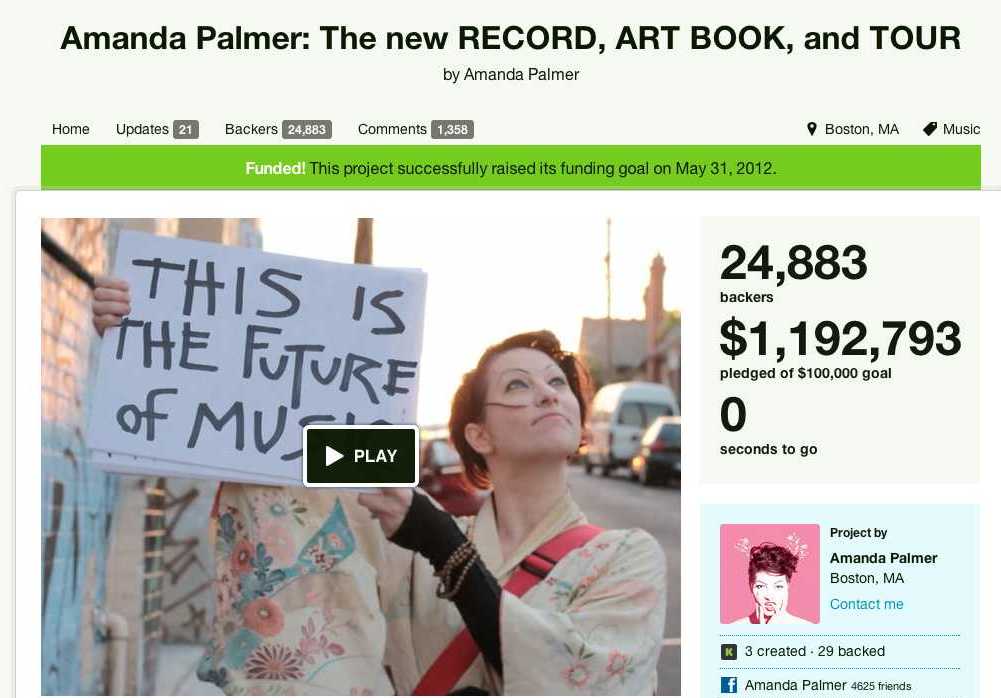Businesses can learn a thing or two about treading the road to social business from musician Amanda Palmer. In her talk at TED2013, she relayed how the “Art of Asking” has become a creative pillar, if not a strategy, for pursuing her music and art and building her business model.
A lot of hard work goes into the art of asking. And even before the asking can commence, a shift in mindset must first take place, and corresponding structures and processes must be present and supported. By her deeds (and countless nameless like her), Amanda Palmer is teaching us social’s first golden rule: in order to receive, you must first give. Before asking others to help you, first ask yourself: have I invested enough in my community to be worthy of their support?
Some of the social business insights I’ve gleamed from Amanda’s TED Talk
Have you proven your worth in the eyes of your community and audience that they would be compelled to do as you asked? There lies the difference between success and luck in this whole art — and science — of asking. Many may simply take kindly to you and do as you ask, or just do it out of curiosity and novelty. That’s luck. But for success to happen, your business must be able to breed reciprocity that can be repeated and sustained.
Amanda Palmer, in my opinion, has mastered this. Not through marketing savvy or utilising high-tech tools, but by focusing first and foremost on people and the relationships she builds with them. This (definitely healthy) obsession with people is then paired with her belief in free music, sharing, and the capacity of social technologies to eliminate boundaries between musicians and audience She knows how to leverage “emergent properties of social networks” such as value creation, knowledge sharing, and collaboration. Amanda has “a plausible promise, an effective tool, and an acceptable bargain.”
She asks people for help, for food, for a couch to crash in exchange for her music and art, her company, some beer (or a lot), and feeding stories to each other (value exchange). Intimacy and serendipity are interwoven in the way she does her art and her business, which allows the value exchanged and shared between her and her supporters to thrive and mature, and sometimes even take other forms (network effect). Amanda stayed true to herself — she remained the street performer surveying the crowd for the one connection that would matter. And when she locks gaze with a fellow stranger, an invitation ensues, a flicker of connection is sparked, and the artist sweeps in to mesmerise. But since there is no stage but a shared space, her audience becomes part of the performance (empowering people and being transformed by it in the process). The more people who joined, the better her business model became (network effect and benevolent reciprocity). And though her admirers grew in number, Amanda made a conscious effort to stay trusting and continue surfing on her audience’s trust (scaling intimacy, staying authentic). The couch crashes didn’t stop. The tweeting for help went on. Evidently this relationship she has built with her fans/community was solid enough for her supporters — 24,883 of them — to crowdfund her new album, ‘Theater is evil’. They raised $1,192,793 in just a month’s time (from the original target of $100,000).
Could this kind of business model be sustainable? As an outsider looking in, I can’t be sure. But I do know that setting limits and being satisfied with limits plays a big part in making such a business possible. Amanda said herself that her music is not for everyone so her end game is not to sell her music and art to everyone in the planet. Neither is it to get filthy rich (I assume). She is successful in the niche she has created for herself. Her goals – artistic and financial – are different from the big traditional music labels. So far, her community seems resolved in helping her achieve those goals.

Image source: http://www.kickstarter.com/projects/amandapalmer/amanda-palmer-the-new-record-art-book-and-tour
Leave a Reply